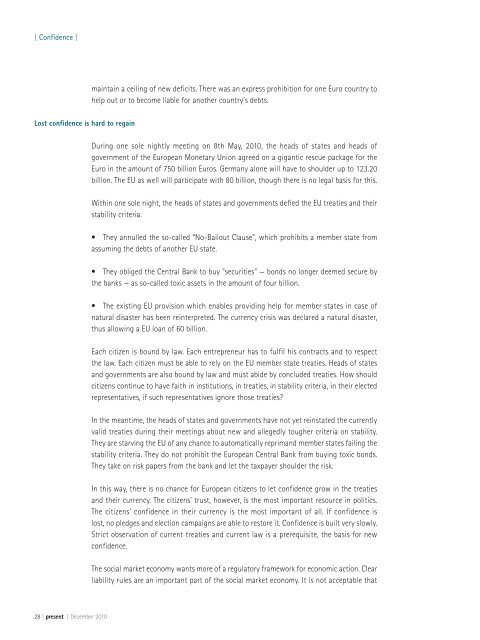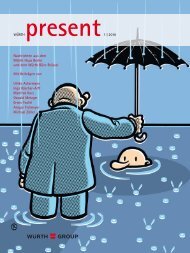Contributions by Ulrike Ackermann Inga Büscher-Arft Manfred Kurz ...
Contributions by Ulrike Ackermann Inga Büscher-Arft Manfred Kurz ...
Contributions by Ulrike Ackermann Inga Büscher-Arft Manfred Kurz ...
You also want an ePaper? Increase the reach of your titles
YUMPU automatically turns print PDFs into web optimized ePapers that Google loves.
| Confidence |<br />
Lost confidence is hard to regain<br />
28 | present | December 2010<br />
maintain a ceiling of new deficits. There was an express prohibition for one Euro country to<br />
help out or to become liable for another country's debts.<br />
During one sole nightly meeting on 8th May, 2010, the heads of states and heads of<br />
government of the European Monetary Union agreed on a gigantic rescue package for the<br />
Euro in the amount of 750 billion Euros. Germany alone will have to shoulder up to 123.20<br />
billion. The EU as well will participate with 80 billion, though there is no legal basis for this.<br />
Within one sole night, the heads of states and governments defied the EU treaties and their<br />
stability criteria.<br />
They annulled the so-called “No-Bailout Clause”, which prohibits a member state from<br />
assuming the debts of another EU state.<br />
They obliged the Central Bank to buy "securities" — bonds no longer deemed secure <strong>by</strong><br />
the banks — as so-called toxic assets in the amount of four billion.<br />
The existing EU provision which enables providing help for member states in case of<br />
natural disaster has been reinterpreted. The currency crisis was declared a natural disaster,<br />
thus allowing a EU loan of 60 billion.<br />
Each citizen is bound <strong>by</strong> law. Each entrepreneur has to fulfil his contracts and to respect<br />
the law. Each citizen must be able to rely on the EU member state treaties. Heads of states<br />
and governments are also bound <strong>by</strong> law and must abide <strong>by</strong> concluded treaties. How should<br />
citizens continue to have faith in institutions, in treaties, in stability criteria, in their elected<br />
representatives, if such representatives ignore those treaties?<br />
In the meantime, the heads of states and governments have not yet reinstated the currently<br />
valid treaties during their meetings about new and allegedly tougher criteria on stability.<br />
They are starving the EU of any chance to automatically reprimand member states failing the<br />
stability criteria. They do not prohibit the European Central Bank from buying toxic bonds.<br />
They take on risk papers from the bank and let the taxpayer shoulder the risk.<br />
In this way, there is no chance for European citizens to let confidence grow in the treaties<br />
and their currency. The citizens' trust, however, is the most important resource in politics.<br />
The citizens' confidence in their currency is the most important of all. If confidence is<br />
lost, no pledges and election campaigns are able to restore it. Confidence is built very slowly.<br />
Strict observation of current treaties and current law is a prerequisite, the basis for new<br />
confidence.<br />
The social market economy wants more of a regulatory framework for economic action. Clear<br />
liability rules are an important part of the social market economy. It is not acceptable that<br />
Photos: Marc Darchinger<br />
Dr. h.c. Erwin Teufel was Minister President of Baden-<br />
Württemberg from 1991-2005, Chairman of the CDU<br />
and a member of the European Constitutional Convent.<br />
For many years, he sat on the EU Committee of Regions<br />
and represented the interests of the German states in<br />
the European Constitutional Convent, convened <strong>by</strong> the<br />
European Council.<br />
certain banks and their representatives realise and<br />
privatise their profits but are not liable for any losses<br />
but burden the public with them.<br />
We need clear rules at last, prohibition of short-selling<br />
and a more effective supervision of international<br />
institutions and rating agencies.<br />
We need to reduce public debt, since financial crises<br />
are always the consequences of over-indebtedness.<br />
The situation will only improve once confidence<br />
is restored. Confidence in the markets, but most of<br />
all confidence of the citizens and their economic<br />
partners in their currency and their government.<br />
| Confidence |<br />
December 2010 | present | 29












